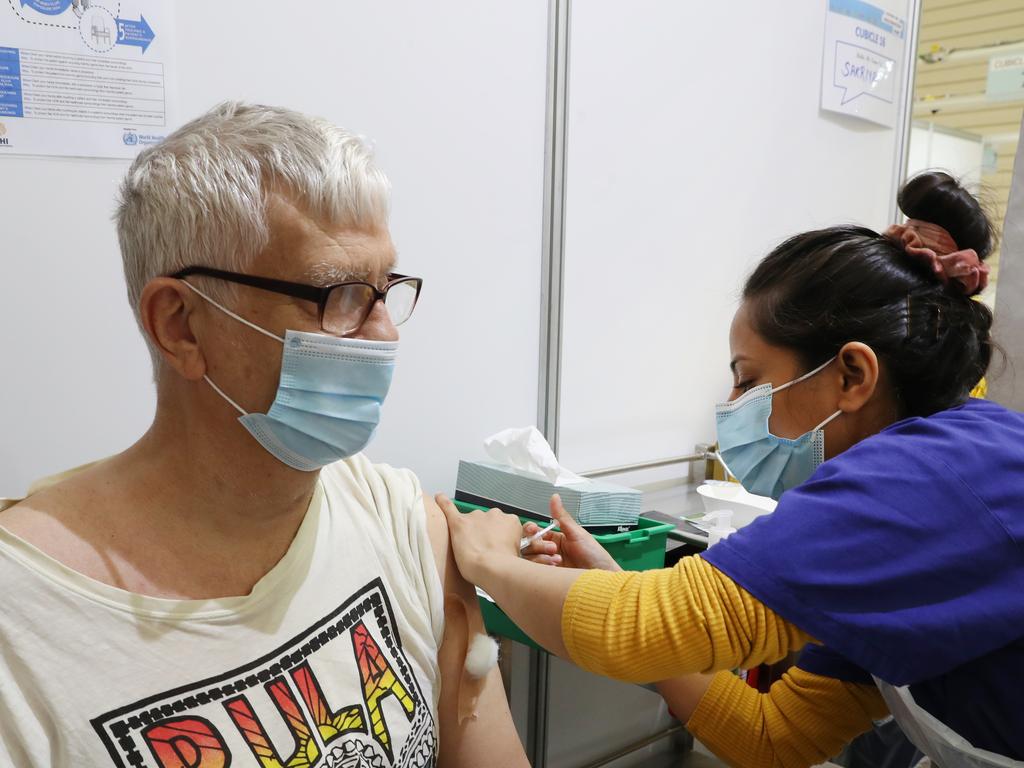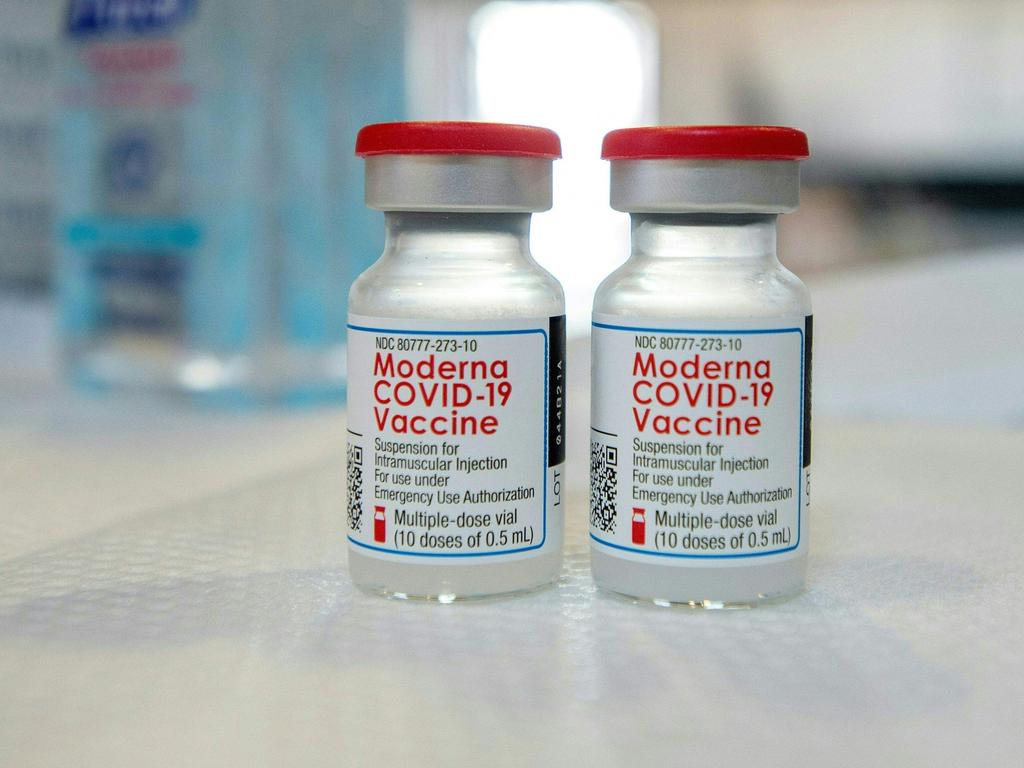The risks of each COVID-19 vaccine for Australians revealed
There are risks with getting certain COVID-19 vaccines in Australia, but experts say there is something that puts us more at risk.
There have been many concerns around Australia’s COVID-19 vaccines, but most notable among them are the risks.
Health authorities, medical experts and scientists continue to advocate for their safety and to debunk myths around common concerns, but many Australians still believe getting a coronavirus jab will put them at risk.
The reality is all vaccines are thoroughly tested for safety before they are approved for use in Australia, which includes careful analysis of clinical trial data, ingredients, chemistry, manufacturing and other factors.
The risk of blood clots in particular is what has Aussies most concerned, or the general idea that if they’re younger, the vaccine will put them more at risk than what contracting COVID-19 would.
The decision to continue the use of the AstraZeneca vaccine was made on a risk-benefit analysis: the risk of contracting COVID-19 and its short-term and long-term effects in certain populations, compared with the risk of these groups experiencing severe side-effects from the vaccine and the availability of alternatives.
Vaccinating against COVID-19 is the easiest way for Australians to get their normal lives back, but millions are hesitant to get the jab.
News.com.au’s Our Best Shot campaign answers your questions about the COVID-19 vaccine roll out. We’ll debunk myths about vaccines, answer your concerns about the jab and tell you when you can get the COVID-19 vaccine.
The risk of getting the AstraZeneca vaccine
“The risk-benefit analysis for Australians right now differs depending on the amount of COVID-19 in the community, your age and the availability of alternative vaccines,” Australian researchers wrote in a piece for The Conversation this month.
“Based on a small amount of data so far, the risk of these blood clots after the AstraZeneca vaccine, for people aged 50-59 is about 0.4 per 100,000 and for those aged 60-69, 0.2 per 100,000.
“But the risk of getting severe COVID-19 or the risk of admission into intensive care from COVID-19 is much higher for the over 50s — nearly ten-fold higher than the risk of clots after the vaccine.”
RELATED: Most common side effects Aussies report from AstraZeneca vaccine

The researchers said the risk was about 6.5 per 100,000 people aged 50-59 and 7.0 per 100,000 for people aged 60-69, based on data from Victoria’s second wave in July last year.
Of course, they highlight there are different risk-benefit calculations for different scenarios.
Analysis released by the European Medicines Agency’s (EMA) human medicines committee last month found incidence of thrombosis with thrombocytopenia syndrome (TTS) following the AstraZeneca vaccine for people aged 20–49 is 20 per million.
That risk then halves to 10 per million for people aged in their 50s and 60s, and drops to about five per million for those 70 and over.
The findings added further weight to Australian Technical Advisory Group on Immunisation advice for people under the age of 50 to receive Pfizer’s mRNA vaccine rather than AstraZeneca.
The risk of getting the Pfizer vaccine
There’s been no evidence of a risk of TTS with the Comirnarty (Pfizer/BioNTech) vaccine.
“Comirnaty (Pfizer) is the preferred COVID-19 vaccine for adults under 50 years of age at this time,” the Australian Government says on its vaccine material.
“However, adults under 50 years of age may still choose to receive the AstraZeneca COVID-19 vaccine if they have weighed up the benefits and the risks.
“The risks of dying or having severe disease from COVID-19 are generally lower in healthy younger adults and they have a higher (although still very rare) risk of TTS after vaccination compared with older adults.”
Health Minister Greg Hunt this week said people over the age of 50 who were currently eligible for the AstraZeneca vaccine could instead wait for Pfizer or Moderna doses, due towards the end of this year.
Vice-president of the Australian Medical Association, Chris Moy, told the ABC people should not wait.
“I would say as somebody who’s sitting in some of those meetings and seeing for example what’s happening overseas where there’s a tsunami of COVID and also the development of variants, that we’re sitting ducks as a country and as individuals until we get a significant portion of the population vaccinated, particularly those over 50,” he said.
The risk of the Moderna vaccine
The Australian Government this month announced it had secured 25 million doses of the Moderna COVID-19 vaccine.
Like the Pfizer vaccine, the Moderna COVID-19 vaccine contains an ingredient called polyethylene glycol (PEG), which has raised concerns regarding its potential to induce an allergic reaction. However, a PEG allergy is extremely rare.
Out of 7,581,429 Moderna vaccine doses administered, there have been 19 reports of anaphylaxis, fewer than 3 cases per million.
Moderna reported three cases of lip or facial swelling in clinical trial participants who had previously had a dermal filler cosmetic injection.
Chair of RACGP NSW & ACT, Associate Professor Charlotte Hespe, previously told a Senate Select Committee on COVID-19 it was hard for people to understand what was at stake if vaccine uptake remained low, given the low numbers of community transmission in Australia.
“It’s hard for people to understand what that risk means to them when we just otherwise really seem to have a normal life,” Associate Professor Hespe said.
RELATED: COVID-19 vaccine side effects Australians are experiencing

“Whereas we know medically that what we’re trying to do is prevent the awfulness that is happening overseas.
“I think some more conversation around ‘this is why we’re doing it as a community’ (would be helpful). Whereas it’s a no-brainer when you’re actually among the pandemic infection numbers.”
Dr Hespe told newsGP if you put getting a vaccine into perspective with other medical procedures people did every day, there was a higher risk of things going wrong with people having colonoscopies than there was of blood clots related to the AstraZeneca vaccine.
“I don’t really know of any of my patients who would not go ahead with a colonoscopy, because for them the benefit of what the test gives them easily outweighs the risk,” she said.
“What a lot of people don’t understand is that we manage risk all the time, there’s a risk associated with everything. It’s just that this has been so extraordinarily public, of course, [with] the vaccine being new and there being different ones on the market.”




